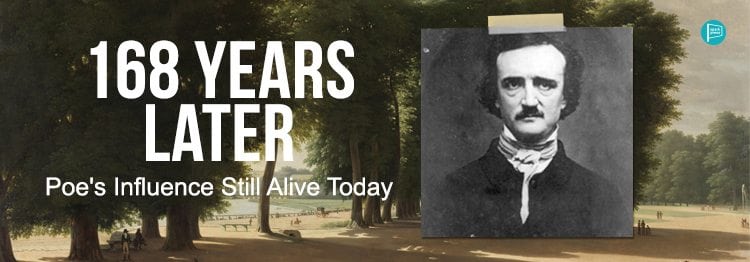
Edgar Allan Poe is known today as a great American poet and short story writer. Who can forget the graphic image of a heart beating below the floorboards, the sound amplified by guilt until it was deafening? Or perhaps you still have the melodic rhythm of Annabel Lee ringing in your ears, long since you last heard it.
But although we still enjoy his works today, it is his influence that makes his legacy all the more special. Thus, to celebrate the 168th anniversary of his death on October 7 (because of course we’d celebrate his death day rather than his birthday), let’s discuss a few places in literature where he had the greatest influence.
Mystery
There were certainly mystery novels before Poe, but none like his. He was the first to add in the puzzle element, creating the distinct flair that detective novels have today, rather than setting a dark mood and using gore.
His character, Dupin, is able to solve impossible crimes using logic alone, and the stories behind how he solved them are conveyed by his roommate. Sound familiar? That’s right: Sir Arthur Conan Doyle, author of the Sherlock Holmes novels, cited Poe and his Dupin as inspiration, even mentioning it in A Study in Scarlet.
“You remind me of Edgar Allan Poe’s Dupin. I had no idea that such individuals did exist outside of stories,” said Watson of Sherlock.
While Sherlock Holmes novels are certainly no longer considered modern, they are still a huge part of the culture, through the popularization of the mystery genre and as a cultural icon itself. If Sir Arthur Conan Doyle is the father of the detective novel, Poe is the grandfather. Following suit came Nancy Drew novels, Agatha Christie, Lee Child, and hundreds of others.
“Poe is so ingrained in us—so deeply encoded into our cultural DNA—that we no longer recognize him,” said Louis Bayard, author of The Pale Blue Eye in a Mystery Scene article.
Psychological Thrillers
Poe was a master of writing horror. His use of a first-person narration allows the reader to delve into the psyche of the protagonist as they experience fearful situations compounded by the character’s previous knowledge, experiences, and emotions. This technique was mirrored by the works of Fyodor Dostoyevsky, Ambrose Bierce, and H.P. Lovecraft.
The high praise for Poe’s influence on the genre of psychological thrillers comes from a more modern author—Stephen King. Often hailed as today’s Poe, he recognizes Poe as a pioneer of the genre. “He wasn’t just a mystery/suspense writer. He was the first,” said King in the same article with Mystery Scene. Poe’s influence can be seen in King’s works such as Carrie and The Shining.
Poetry
Poe considered himself primarily a poet, and his influence on poetry and music has not been lost. Embraced by the French, the attention he paid to meter and rhyme widely influenced 18th century French poetry. Additionally, the roots of works by T.S. Eliot and Ezra Pound can be traced back to Poe.
Music has also been profoundly impacted by Poe’s poetry. The last poem he wrote before he died, the haunting Annabel Lee, has been turned into a song by Stevie Nicks. Lines from his poems are often used in songs by everyone from Marilyn Manson to Symphony X to Panic! At the Disco to Voltaire.
Sources:

Please consider Poe’s influence on Wilkie Collins who preceded Arthur Conan Doyle in crime fiction. The great Cuff!